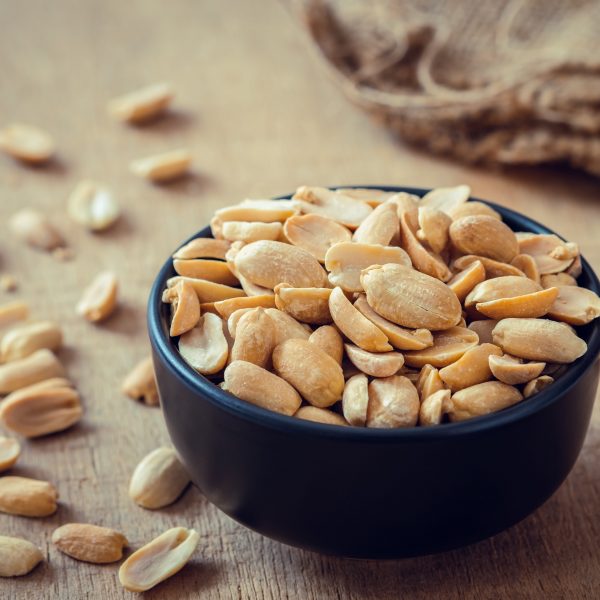Can Dogs Eat Peanuts?

Dogs tend to have a reputation for eating almost anything, regardless of whether it’s good for them. On top of that, there are many foods that are safe for humans and not for dogs. What about peanuts? Can dogs eat peanuts? Here’s what you need to know:
Can Dogs Eat Peanuts?
Although peanut butter is a popular ingredient for many dog treat recipes, the salted peanuts that you enjoy aren’t actually that great for your dog. Dogs can eat peanuts, but the only safe kind for them is dry-roasted unsalted peanuts. It’s also important to limit your dog’s peanut intake to a few peanuts at a time and avoid making them an everyday treat.
Peanuts are not considered toxic to dogs, so your dog will be fine if they happen to eat a salted peanut here and there by accident. However, in large quantities, peanuts can be harmful, especially if they are flavored or salted. It’s also important to make sure you remove peanut shells completely as these are a choking hazard and are particularly dangerous for small dogs.
Why Are Salted Peanuts Unsafe For Dogs?
Although your dog may be able to handle a few salted peanuts if they ingest them by accident, it’s best not to share your flavored or salted peanuts with your dog. Here are few reasons why salted peanuts are considered unsafe for dogs:
1. Too Much Sodium Can Lead to Salt Toxicity
Just as too much sodium can be harmful to our health, the same is true for our dogs. A bunch of salted peanuts now and then won’t usually have much effect on us, but our dogs can’t handle as much sodium as we can.
This is particularly true for smaller dogs. For them, large amounts of salted peanuts can lead to salt poisoning if it means they get too much sodium at one time and their bodies can’t process it.
Symptoms of salt poisoning in dogs include vomiting, lethargy, disorientation, excessive thirst, frequent urination, decreased appetite, diarrhea, tremors, and more. These are all symptoms you should never ignore in your dog, so if you see any of them, get to the vet.
2. Flavored Peanuts Could Contain Xylitol
Xylitol is popping up in more foods than ever before. Because it is one of the toxic foods for dogs, that also means xylitol poisoning is also on the rise.
In general, it’s a good idea to avoid giving flavored or salted nuts to your dog. With the increased chance of these nuts containing xylitol, it’s an even better idea to make sure your dog doesn’t eat them.
This is one of the reasons many dog owners prefer to make their own peanut butter at home. Not only can they make sure they avoid xylitol, but they can also reduce the oil and salt content of the peanut butter to make sure their dog has a delicious treat that won’t harm them.
3. Peanuts Are a High-Fat Food
Peanuts contain high levels of fat, which is one of the reasons they are a popular snack for people. But, high-fat foods can cause issues for your dog if you’re not careful.
Some dogs handle fat content better than others. If your dog has a sensitive stomach, high-fat foods can make them feel sick. They may even throw up or have diarrhea.
Even if your dog seems to handle high-fat foods well, you still need to be aware of how much they are eating. Dogs that eat high-fat foods in large quantities or on a regular basis over time tend to develop pancreatitis.
When it comes to whether dogs can eat peanuts, they can, but you do need to be aware of what type of peanuts you give them and how much you’re giving them. If your dog really loves peanuts, just make sure you have some unsalted ones to be able to give to them and give them as a treat in moderation.
